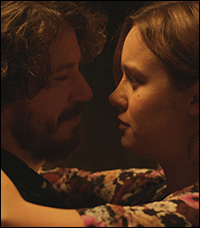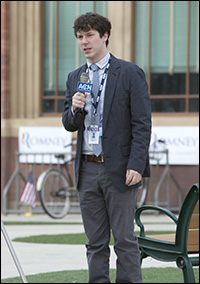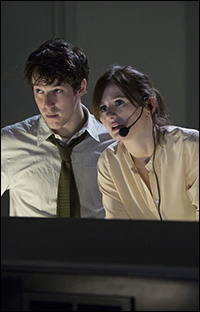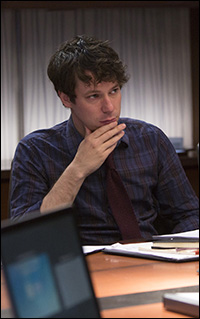
Over the past two seasons, fans of Aaron Sorkin's polarizing HBO series "The Newsroom" have discovered what theatregoers and Broadway aficionados have known for years now: John Gallagher, Jr., who plays lovelorn, hyper-intuitive senior news producer Jim Harper on the show, combines boundless acting talent with an endearing, nice-guy likability that is irresistible and impossible not to love.
While he sparkles on screen, the 29-year-old, floppy-haired Gallagher got his start on the stage — capturing a Tony Award in 2007 for his powerful portrayal of tortured teen Moritz Stiefel in the hit Broadway musical Spring Awakening. He had made his Broadway debut the year before as another angst-ridden teen in David Lindsay-Abaire's Rabbit Hole. Following those successes, Gallagher, who is also a musician, appeared in a diverse array of roles in productions ranging from Beau Willimon's political drama Farragut North and Jez Butterworth's transcendent British drama Jerusalem to the hit Green Day rock opera American Idiot, in which he played a stifled suburban youth grappling with anger and ennui in post-9/11 America.
Chock full of talented stage actors, the once-critically-derided "Newsroom" is in the midst of a rejuvenated second season and enjoying boosted ratings for HBO. While that's been good news for Gallagher, the actor isn't resting on those laurels. This summer, he's been busy promoting an indie project, "Short Term 12," that has the potential to be a sleeper success. The buzzed-about film captured both the Grand Jury Prize and the Audience Award for best narrative feature at the South By Southwest Film Conference and Festival in March and has generated enthusiastic word-of-mouth since then. It has opened in New York and LA and will be followed by a national rollout.
Directed by Destin Daniel Cretton, "Short Term 12" centers on the day-to-day "line staff" toiling at a foster care facility and the at-risk kids and troubled teens in their care. The film is loosely based on Cretton's own eye-opening, life-changing experience working at such a facility when he was just out of college. Gallagher plays good-hearted guy Mason. A staff member who himself was raised in a large and diverse home by loving foster parents, Mason is the patient and adoring boyfriend of Grace, the tough-as-toenails staff supervisor of the facility. While Grace (up-and-comer Brie Larson) remains fiercely devoted and protective of the kids in her care and commands great respect from them, she's struggling with a tumultuous past of her own.
Gallagher talks about the rejuvenated season of "The Newsroom," the passion-project quality of his new indie film "Short Term 12," and challenge of playing an endearing, easygoing character without many flaws.
| |
 |
|
| John Gallagher, Jr. and Brie Larson in "Short Term 12" |
John Gallagher, Jr.: From the minute I read it, I just thought that Destin told a story via screenplay probably the best that I had ever read as an actor. I was really blown away by the script. I fell in love with all the characters and with the story. And once I got to meet Destin and talk to him, it became very quickly apparent that this was a special person and a special artist. I'm drawn to likeminded people that have a good story to tell, and we really hit it off. It was a labor of love. But as intense as a lot of the material is in the film, I don't know if I've ever had as much fun on a film set before. It was just a really great environment — and it all started with Destin, who's such a wonderful person. He picked such an intricate ensemble of not only great actors but great individuals, people that you just want to be around. And it's all the more sweet now that audiences are actually taking to the film and the word is getting out.
Why was it such a fun set to work on?
JG: It was just very relaxed. We didn't have a lot of money to make the film. And so we didn't really get to labor over things too much. You had to kind of keep it moving. We didn't get to do a ton of takes. And we didn't have a ton of time to rehearse. So there was something very easy and very freeing and fluid about the style in which it was made. But at the same time, Destin always had a very, very clear vision and was very much in control as a filmmaker. I think to be able to strike that balance of putting your stamp and putting your mark on something, which Destin clearly has done, and at the same time taking a step back and making sure that the actors have room to play. Because you get so many happy accidents that way and so many kind of naturalistic moments if you keep the heat low and the pressure off a little bit.
What kind of scripts are you usually looking for as an actor?
JG: I never have any real sense of what I'm looking for. Mostly I look for something that I would want to see, that I think I would like. When I'm reading a script, if my imagination starts getting carried away and I start imagining the film coming to life and picturing it and thinking, regardless of my involvement, is this something that I would want to go to a movie theatre and see? That's a very important part for me. And within two to three pages of "Short Term 12," I wasn't even thinking so much about how it pertained to me as an actor considering taking on a role. I was just thinking that I love the story so much and thought I want to see this happen. If it gets me excited on that base level as a film lover, then chances are it's something I'm going to really want to be available to do as an actor. So I like to just read it and see what it has to offer and see if it inspires me or not.
| |
 |
|
| Gallagher in Spring Awakening. |
JG: Yeah, that was there from the script — just the detail and the kind of compassion and the simplicity. And exactly, like you just said, the way that it really created this believable world, which is something that I didn't know a ton about to begin with. I didn't know a lot about the foster care system. So it was very enlightening to learn a lot about that.
And I'm drawn to films that really can transport you to someplace and take you there and make you believe it and make you want to spend time within those walls to get to know all those characters. It's not the easiest feat to accomplish. And this film just really transports you. The way that the film begins is really just — it hits the ground running. And in indie cinema, a lot of the times the dialogue has a sort of less-is-more approach. In a lot of smaller films, you watch people not quite know what to say to each other. But then you have a film like "Short Term 12," which begins with a monologue, essentially. It begins with a guy telling a story. And I just love good stories and storytelling. And there was something really special about reading a script that started with a page-and-a-half of somebody telling a story. That really excited me.
And Destin loosely based the script on his own real-life experiences working at a foster care facility?
JG: Destin worked at a foster care facility for two years. And he said, in so many words, that it was one of the hardest and most intense things that he's ever done in his life, and it was also one of the most life-changing and rewarding and inspiring things.
Were there any illuminating anecdotes that he shared with you that helped you in working on the film or in understanding your character?
JG: Well, he brought in a friend of his from the facility where he worked, who still works there to this day. Who has made basically a life, a career out of working in the foster care system. And he was able to come in and talk to the cast and kind of show us the ropes and give us a rundown about how the day-to-day experience really goes down in a place like that. So that was really valuable. I also got to go to a foster care facility in California and shadow a "line staff" member, someone that does what my character Mason does in real life, and he gave me some pointers. And being able to walk around and to meet kids who are actually living in a place like this was really inspiring and I think ultimately very informative to what I ended up doing with this character.
How specifically was it informative in terms of figuring out how to play Mason and bring that character to life?
JG: One thing that I found amazing about the situation was that this guy that I was following around and shadowing, he had such a great command of the kids. He really has their respect. But he was also really funny and kind of a joker and made them laugh and disarmed them and distracted them from being trapped in their heads and being trapped with their painful emotions. He told me that you can't even imagine what some of these kids have been through. So anything you can do to keep it fun, keep it light, that's really important. Being there, it really clicked for me — why humor and entertainment and being able to make fun of yourself was an important tactic, a coping mechanism, to not only gain the respect of these kids but to also brighten their day a little bit.
| |
 |
|
| Gallagher on "The Newsroom." | ||
| Photo by Melissa Moseley |
JG: I just loved that Destin had written such an unapologetically good guy. He's just such a virtuous person. He's been through a lot in his life. And he could have come out on the other end of it very damaged and very internal and probably very angry. But he got a second chance at life early on by being adopted by foster parents. And it's changed his whole outlook and his whole perspective. He's just such a natural caretaker. And in high-stakes drama, especially in film, I think you get a lot of selfish characters because that is what keeps drama going. That's what kind of keeps the stakes high.
And I love that Destin was able to create a story with so much drama and such high stakes but have one of the main characters be just ultimately selfless. And I also thought that was amazing — and not easy to do. For Mason, ultimately, the only thing that he really ever said that he needs is for his girlfriend to start healing. So even the thing that he needs is actually a very selfless and nurturing and nourishing thing. I love that about him. And, you know, I'd love to learn from that. I'd love to be more like that in my life. And anytime you can learn something about yourself from a character, that's just the ultimate bonus as an actor. Patience and selflessness are both qualities that I want to try to bring more of into my life, and I have the character to thank for it.
There's so much great stage talent working on "The Newsroom" — from you and Alison Pill to Thomas Sadoski and Jeff Daniels. Do you think actors who have lots of experience working in theatre do particularly well in speaking the rhythms of Sorkin's dialogue and working with his word-dense, breakneck-paced style?
JG: Yeah, I thought that — until I got there and saw how amazing Dev Patel and Olivia Munn were in their roles and with speaking certain dialogue. And neither one of them have spent any time onstage. I think it does help, for me at least, that I have a history in learning a lot of dialogue, because you have to learn a lot of it when you do something on stage. So your muscle is kind of stretched and warmed up to jump in and learn a ton of dialogue. And you have to constantly learn and relearn dialogue every day working on an Aaron Sorkin show. So it was something that I felt a little bit conditioned for. And I think that it probably is not a coincidence that so many theatre actors end up on a show like that. And, you know, we have Alan Poul and Scott Rudin producing "The Newsroom," and they happen to be huge theatre fans. They see a ton of theatre and are familiar with all those actors.
What adjustments did you have to make to working in television and acting in front of a camera on a regular basis for the first time?
JG: I've always been a fan of the quieter, stiller moments. And most shows that I've done on stage — almost all of them — I'm pretty sure I've been given a note at one time or another from my director to be louder and to be bigger. So adjusting my acting to more of a quiet, kind of naturalistic, on-camera type of performance is something that didn't take a lot of work. It was something that I kind of fell into naturally. I think it was a place where I'm very comfortable. Especially with Aaron's dialogue. You don't have to do that much. If you just kind of back off and let it happen, it does a lot of the work for you, because it's such masterful writing.
| |
 |
|
| John Gallagher, Jr. and Emily Mortimer on "The Newsroom." | ||
| Photo by Melissa Moseley |
JG: I think that that has to exist. I think that a version of "The Newsroom" that people aren't talking about or people aren't debating would actually be a really boring show. And I think it would do a disservice to what the show is all about. Which is about striving for something better. And what does that mean to different people that have different opinions and different perspectives? So there are some people who love it very passionately, and then there are people who dislike it very passionately. And I welcome all views. I think if it gets people talking, that's one of the most important things.
Critics have responded more enthusiastically to the show so far this season. Are you pleased with that reaction? And in your view, how do you think the show got better or improved this season?
JG: I think Aaron made a big choice to make sure that the strength of the show is really geared towards the characters and the character development and the stories that were happening to the characters and the personal lives of the characters. Because ultimately, in terms of making good television, that's what it comes down to. You have to have good characters and characters that people care about.
So the formula got shaken up a little bit, I think, from Season 1 to Season 2. Season 1 was very episodic, in that every episode kind of revolved around one big watershed news moment. But Season 2 is actually much more of a slow burn, and you really get more time to spend with each of the individual characters. You get to learn a little bit about what's going on with them. And I think the juxtaposition of the fact that news is always breaking, it's always happening, and we're the people that are there to usher it into the homes viewers who are turning on their televisions every night. So let's focus on them and what it is like for them to chase a good story. So from my eye at least, that's what the shift has been. And I think that some people are responding a lot more positively to that this time around.
Has the show given you insight into how a newsroom really works and how news is created and disseminated and how producers come to decisions about what gets on the air or not?
JG: A little bit. But I certainly would have no clue how to hold my own in that environment, even with some of the research that I've done and some of the lessons that I've learned from hearing stories of what it's actually like on the inside. But I watch it the news differently now. I definitely pay attention to the news in a different way. I think more about how it gets to us. If something starts as information and then it turns into information that comes to you via a news outlet, what happens to it in that process? And who are all the people that are working on it? Because it takes a village, obviously, for something like that to get off the ground. So my respect for journalists exists on a different plane than it used to. It's definitely gone up for the people who devote their lives to that line of work. It's a really intense thing to do.
| |
 |
|
| Gallagher on "The Newsroom." | ||
| photo by Melissa Moseley |
JG: Yeah, it touches on the risks of breaking a really big news story and the responsibility that entails. Because it's easy to get it wrong sometimes. And owning up to that and trying to stay trustworthy and responsible is a daily struggle for all of these people. So I think that the [Genoa] storyline definitely touches upon some of those intricacies. Journalists are human beings, and they try and try again. And sometimes they succeed, and then just like anyone else they fail at times as well. So are Jim and Maggie, those two crazy kids, finally gonna get together at some point?
JG: You know, I have no idea. I'd like to see it happen. But who knows? I think they're on different trajectories right now. I think they're getting to know themselves. And whether that means that knowing themselves better to make them better suited to be able to be good partners for each other in the future, I don't know. But I definitely wouldn't give up hope.
So what do you have coming up next? Will there be any new stage roles in your near future?
JG: I have no idea. I have no clue. I recently wrote a play [Slainte] and had a reading of it in June at New York Stage and Film's Powerhouse theatre program at Vassar College. That was the last thing that I did that in any way was involved in theatre. I didn't play a part in it. I just wrote it. And it was really overwhelming and really rewarding. My dream would be to see a production of it done someday. But I'm obviously very eager to get back on stage myself. I don't know when or where.
What's the play about — the one that you wrote?
JG: It's in the tradition of movies like "The Big Chill" and "Diner." It's basically about a group of friends in their mid-to-late 20s having various levels of existential crisis and trying to figure out what's next for them. The story is centered on a group of unemployed actors who really stepping back and taking a second look at their lives under the magnifying glass and seeing what changes they need to make. And it kind of wrestles with varying ideas of what success means to different people. But ultimately it's a story about a group of friends.
Christopher Wallenberg is a Brooklyn-based arts and entertainment reporter and regular contributor to the Boston Globe, Playbill and American Theatre magazine. He can be reached at [email protected].









